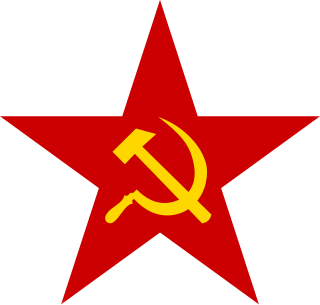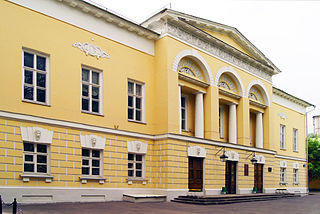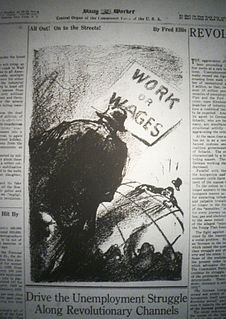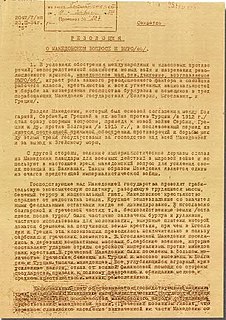 W
WThe Communist International (Comintern), known also as the Third International (1919–1943), was an international organization that advocated world communism. The Comintern resolved at its Second Congress to "struggle by all available means, including armed force, for the overthrow of the international bourgeoisie and the creation of an international Soviet republic as a transition stage to the complete abolition of the state". The Comintern was preceded by the 1916 dissolution of the Second International.
 W
WThe 2nd World Congress of the Comintern was a gathering of approximately 220 voting and non-voting representatives of Communist and revolutionary socialist political parties from around the world, held in Petrograd and Moscow from July 19 to August 7, 1920. The 2nd Congress is best remembered for formulating and implementing the 21 Conditions for membership in the Communist International.
 W
WThe 7th World Congress of the Communist International (Comintern) was a multinational conference held in Moscow from July 25 through August 20, 1935 by delegated representatives of ruling and non-ruling communist parties from around the world and invited guests representing other political and organized labor organizations. The gathering was attended by 513 delegates, of whom 371 were accorded full voting rights, representing 65 Comintern member parties as well as 19 sympathizing parties.
 W
WAmicii URSS was a cultural association in interwar Romania, uniting left-wing and anti-fascist intellectuals who advocated a détente between their country and Joseph Stalin's Soviet Union. Created in the spring of 1934 by Petre Constantinescu-Iași, an activist of the previously outlawed Romanian Communist Party, the society took its inspiration from the French Amis de l'URSS and from the worldwide network. Actively encouraged and financed by the Comintern, Amicii URSS was viewed with suspicion by authorities — never officially registered, it was eventually banned on the orders of Premier Gheorghe Tătărescu on November 25, 1934. It ceased its activity after that point, but constituted a precedent for the Romanian Society for Friendship with the Soviet Union (ARLUS).
 W
WThe Balkan Federation project was a left-wing political movement to create a country in the Balkans by combining Yugoslavia, Albania, Greece, Bulgaria, and Romania.
 W
WBolshevization was the process starting in the mid-1920s by which the pluralistic Comintern and its constituent communist parties were increasingly subject to pressure by the Kremlin in Moscow to follow Marxism–Leninism. The Comintern became a tool of soviet foreign policy. That policy downplayed autonomy in favor of support for the Soviet Union and its foreign policy.
 W
WThe Communist International was the eponymous official magazine of the Moscow-based Communist International (Comintern). The publication was published from 1919 until 1943 in a multiplicity of languages including Russian, German, English, and French. Issued irregularly, monthly, or semi-monthly depending upon the language and year, the magazine is regarded as a vital primary source for the study of the international Communist movement.
 W
WThe Congress of the Peoples of the East was a multinational conference held in September 1920 by the Communist International in Baku, Azerbaijan. The congress was attended by nearly 1,900 delegates from across Asia and Europe and marked a commitment by the Comintern to support revolutionary nationalist movements in the colonial "East" in addition to the traditional radical labour movement of Europe, North America, and Australasia. Although attended by delegates representing more than two dozen ethnic entities of the Middle and Far East, the Baku Congress was dominated by the lengthy speeches of leaders from the Russian Communist Party (RCP), including: Grigory Zinoviev, Karl Radek, Mikhail Pavlovich, and Anatoly Skachko. Non-RCP delegates delivering major reports included Hungarian revolutionary Béla Kun and Turkish feminist Naciye Hanim.
 W
WThe Executive Committee of the Communist International, commonly known by its acronym, ECCI (Russian acronym ИККИ), was the governing authority of the Comintern between the World Congresses of that body. The ECCI was established by the Founding Congress of the Comintern in 1919 and was dissolved with the rest of the Comintern in May 1943.
 W
WThe Communist Women's International was launched as an autonomous offshoot of the Communist International in April 1920 for the purpose of advancing communist ideas among women. The Communist Women's International was intended to play the same role for the international women's movement that the Red Peasant International played for poor agrarians and the Red International of Labor Unions played for the international labor movement.
 W
WThe International Lenin School (ILS) was an official training school operated in Moscow by the Communist International from May 1926 to 1938. It was resumed after the war, run by the CPSU and continued to the dissolution of the USSR. The ILS taught both academic courses and practical underground political techniques with a view to developing a core disciplined and reliable communist political cadres for assignment in Communist Parties around the world.
 W
WInternational Red Aid was an international social service organization established by the Communist International. The organization was founded in 1922 to function as an "international political Red Cross", providing material and moral aid to radical "class war" political prisoners around the world.
 W
WInternational Unemployment Day was a coordinated international campaign of marches and demonstrations, marked by hundreds of thousands of people in major cities around the world taking to the streets to protest mass unemployment associated with the Great Depression. The Unemployment Day marches, organized by the Communist International and coordinated by its various member parties, resulted in two deaths of protestors in Berlin, injuries at events in Vienna and the Basque city of Bilbao, and less violent outcomes in London and Sydney.
 W
WOtto Katz, also known as André Simone amongst other aliases, was born in Jistebnice south of Prague, Bohemia, on May 27, 1895. He was hanged on December 3, 1952, after he was convicted in the Slánský trial. He was one of the most influential agents of the Soviet Union under Stalin in Western intellectual and artistic circles during the 1930s and 1940s.
 W
WThe Peasant International, known most commonly by its Russian abbreviation Krestintern (Крестинтерн), was an international peasants' organization formed by the Communist International in October 1923. The organization attempted to achieve united front relations with radical peasant parties in Eastern Europe and Asia, without lasting success. After failing to make headway with important initiatives in Bulgaria, Yugoslavia, and China in the 1920s, the organization was placed on hiatus at the end of the decade. The so-called Red Peasant International was formally dissolved in 1939.
 W
WThe Negro Worker was the newspaper of the International Trade Union Committee of Negro Workers. It was called The International Negro Workers’ Review, when launched in 1928, but the name was changed in March 1931. It ceased publication in 1937.
 W
WPhilatelic International (Filintern) was an international philatelic society of collector-workers. It was founded and based in the Soviet Union in the 1920s to 1940s.
 W
WThe resolution of the Comintern of January 11, 1934, was an official political document, in which for the first time, an authoritative international organization has recognized the existence of a separate Macedonian nation and Macedonian language.
 W
WThe Tatarbunary uprising was a Bolshevik-inspired peasant revolt that took place on 15–18 September 1924, in and around the town of Tatarbunary in Budjak (Bessarabia), then part of Romania, now part of Odessa Oblast, Ukraine. It was led by a pro-Soviet revolutionary committee which called for the creation of a Moldavian Soviet Republic and an end to "Romanian occupation".
 W
WTatlin's Tower, or the project for the Monument to the Third International (1919–20), was a design for a grand monumental building by the Russian artist and architect Vladimir Tatlin, that was never built. It was planned to be erected in Petrograd after the Bolshevik Revolution of 1917, as the headquarters and monument of the Comintern.
 W
WThe Vladimirov diaries: Yenan, China, 1942-1945 was a book written by Peter Vladimirov; it was published by his son Yury Vlasov in 1973, twenty years after Vladimirov's death. The book recounts the events in Yan'an during the Second World War, particularly information on Mao Zedong.
 W
WThe Yokinen Show Trial was a March 1931 public disciplinary proceeding conducted by leaders of the Communist Party, USA (CPUSA) against August Yokinen, a Finnish-American Communist janitor who allegedly made racially disparaging remarks against several African-American members of the organization at a social event. Attended by more an audience of 2,000 people, the "party trial" of Yokinen was publicized across America and was intended to emphasize the CPUSA's commitment to eliminate "White Chauvinism" from its ranks and to thereby bolster its status in the eyes of the black American working class and among white intellectuals seeking an end to racism.
 W
WThe Young Communist International was the parallel international youth organization affiliated with the Communist International (Comintern).